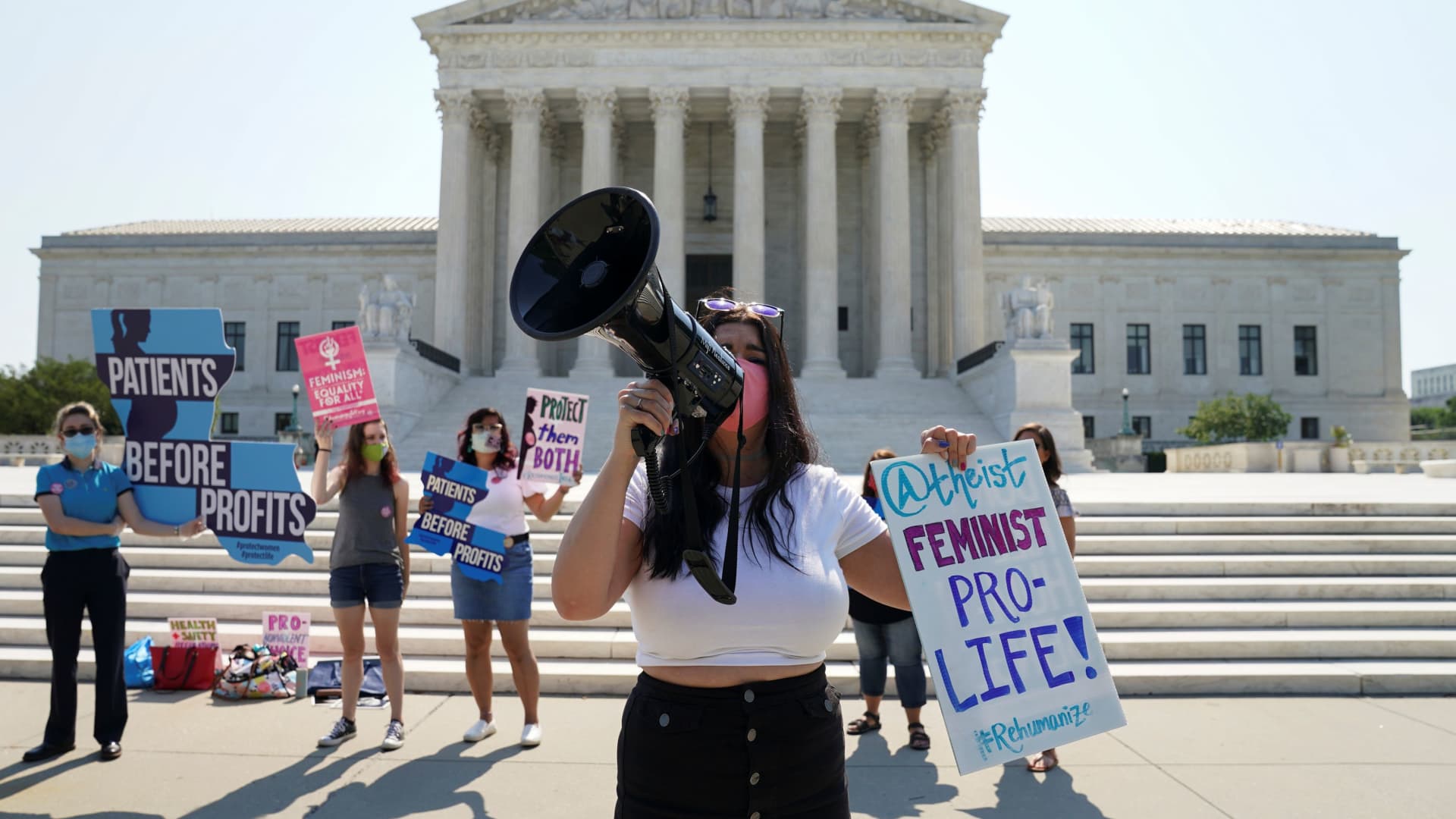Several U.S. states immediately banned abortion on Friday in the wake of the Supreme Court’s ruling that overturned Roe v. Wade.
The high court’s decision ended a half-century of constitutionally protected abortion rights, which means that states will now be allowed to regulate the procedure.
At least 13 states have laws on the books that either ban abortion immediately or will do so soon.
Abortion bans in Louisiana, Missouri, Kentucky and South Dakota went into immediate effect. The laws make performing an abortion a felony punishable by yearslong prison sentences. However, women cannot be prosecuted for receiving an abortion, according to the text of the laws.
Read the reactions to Roe v. Wade being overturned
In Louisiana, anyone who performs abortions would face one to 10 years in prison with exceptions for physicians to protect the life of the mother, end an ectopic pregnancy or remove a fetus that is no longer alive. It does not make exceptions for cases of rape or incest. Democratic Gov. John Bel Edwards signed the law earlier this week.
In Missouri, anyone who performs an abortion would face a five to 15 year jail sentence, unless the procedure is done in the case of a medical emergency.
In Kentucky, anyone who performs an abortion would face one to five years in prison. The law makes exceptions to save the life of the mother or procedures by physicians that result in the unintentional end of a pregnancy. It does not make exceptions for rape or incest. Gov. Andy Beshear, a Democrat, condemned the law as extremist.
Any person who performs an abortion in South Dakota now faces up to two years in prison, unless the procedure is performed to protect the life of the mother. It also does not make exceptions for rape and incest.
Idaho, Tennessee and Texas will implement abortion bans in 30 days, according to the text of the laws. Abortion bans in Arkansas, Mississippi, Missouri, North Dakota, Oklahoma, Utah and Wyoming go into effect after the attorney general, governor or certain legislative bodies certify that the Supreme Court has done away with Roe.
On Friday, U.S. Attorney General Merrick Garland said the Department of Justice will protect women who travel from states with bans to receive abortions in states where the procedure is legal.
“Few rights are more central to individual freedom than the right to control one’s own body, Garland said. “The Justice Department will use every tool at our disposal to protect reproductive freedom. And we will not waver from this Department’s founding responsibility to protect the civil rights of all Americans.”
Abortion pill next flashpoint
States banning abortion are also outlawing use of the abortion pill to end pregnancies. However, women cannot be punished for receiving abortions under the laws, which means many people may turn to online pharmacies based abroad to have pills delivered to their homes.
The abortion pill, mifepristone, is approved in the U.S. to end pregnancies before the 10th week of pregnancy. The Food and Drug Administration first approved the medication in 2000, but required women to obtain it in person under a program that monitors certain drugs for safety risks. Abortion rights advocates fiercely criticized the FDA requirements, arguing that mifepristone had a long and proven track record as a safe and effective way to end an early pregnancy.
In response to the Covid-19 pandemic last year, the FDA temporarily lifted the requirement that women obtain the pill in person. In December, the agency permanently ended the in-person requirement, which will allow certified pharmacies in the U.S. to fill and send prescriptions by mail.
Garland said states cannot ban mifepristone based on disagreements with FDA’s judgment that the medication is safe and effective. U.S. Health Secretary Xavier Becerra said his department will use “every lever” to protect access to abortion care including with the pill.
Medication abortion has become increasingly common in the U.S. More than half of abortions in the U.S. are with the pill, according to survey by the Guttmacher Institute of all known providers in the U.S.
Although the state bans do not punish women who receive abortions, there are cases where people have been reported to authorities for trying to end their pregnancies.
In April, a woman in South Texas was charged with murder after allegedly having a self-induced abortion. The district attorney ultimately dismissed the indictment, saying it is clear that she “cannot and should not be prosecuted for the allegation against her.”
